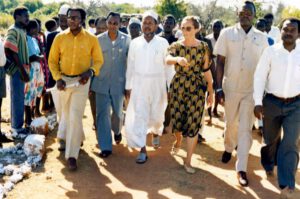23andMe’s Senior Director of Research, Joanna Mountain, is a geneticist who worked as a consultant on the series and was interviewed for a few of the episodes. Mountain, who completed her Ph.D. in Genetics at Stanford University, is also a guest blogger for the series. Her post below first appeared on the Finding Your Roots program page. We’re republishing it here with the permission of PBS.
By Joanna Mountain, Ph.D., Senior Director of Research 23andMe
As a geneticist at 23andMe, I combine my understanding of human prehistory and DNA variation to develop tools that help people answer one of the more fundamental questions we ask ourselves:
“Where am I from?”
It’s always fascinating and often surprising to answer that question, as the powerful stories in PBS’s series “Finding Your Roots” illustrate.
Intriguingly, the question “Where are you from?” has a precise meaning for many eastern Africans, as I learned when I was a Peace Corps volunteer in Kenya.
I always respond to that question with “California,” where I have lived most of my life, rather than “England” where I was born.
But unlike many Americans, Kenyans often respond to that question with a description of their ancestral origins – the place and its people. They may never have visited the place or people, but that is where they are “from.”
The answer to this question about our deeper ancestry allows us to connect with our ancestors of hundreds or thousands of years ago.
If we go back far enough in human history the answer to the question “where are you from” is the same for everyone:
“We’re from Africa.”
But telling someone that “we are all from Africa” doesn’t really answer the question about a person’s origins.
Our DNA has no sense of where we live or where we were born, but it does point directly to our deeper ancestry and to where our ancestors were living over the last few thousand years. This power of DNA to answer questions about human prehistory is what drew me to genetics in the first place. Solving puzzles and mysteries has always fascinated me.
My passion for genetics is also rooted in Africa, in Kenya specifically, where I taught math and science as a Peace Corps volunteer 25 years ago. The mystery I came across there was in the faces, languages and diets as well as other cultural practices of the people I met. I couldn’t help being fascinated by the diversity. The tall, slender Nilotic-speaking Maasai of southwestern Kenya differ in so many ways from the Bantu-speaking Mijikenda who live on the eastern coast where I was teaching. I left Kenya mystified by the origins of that diversity.

Shortly after I returned home to California, a friend introduced me to a famous geneticist at Stanford University, Luca Cavalli-Sforza, who would give me the tools to solve that mystery. Cavalli-Sforza, who recently celebrated his 90th birthday, taught me the basics of DNA and the theories of population genetics. Together we poured over genetic data of peoples from all continents. Our goal was to discern the broad patterns of ancient human migrations.
I went on to earn my PhD in genetics, delving more deeply into the mysteries of human prehistory. Throughout my research I returned to focus on Africa, trying to understand the diversity that I had observed in Kenya. My research, conducted with collaborators from around the world, helped reveal the general shape of the history of African peoples over the last 100,000 years. We now believe that the ancestors of living peoples began to move from eastern or southern Africa into other parts of the continent by 75,000 years ago. This early spread within Africa explains the high level of genetic diversity in the continent today.
The diversity among the people of Kenya that I noticed over two decades ago, which sparked my interest in the study of genetics, has been explained in part by migrations into eastern Africa of people speaking all the major languages of Africa. We’ve learned this by combining genetic information with archaeological and linguistic evidence.
In the same way that we can understand the diversity within Africa, we can understand the diversity of all living people by studying DNA, archaeology and languages. Both the origins of humankind in Africa and the patterns of subsequent migration within and outside of Africa are written in the DNA of living people. We all share a common history in Africa, but the DNA of people both within Africa and elsewhere has differentiated over time as people migrated across the planet, becoming, until the last few hundred years, more and more isolated from one another.
Now that we know how DNA aligns with prehistoric migrations, we can trace the DNA of individuals to northern Europe or Central Asia, South America or the Near East, western Africa or Oceania. That information about where DNA is from can, in turn, answer questions about our ancestors. Were they struggling to feed their children through hunting red deer in northern Europe, harvesting shellfish in southeastern Asia, raising alpacas in the highland plateaus of western South America, or digging for tubers in eastern Africa? DNA shows that some of us have ancestors who faced the challenge of survival using several of these strategies.
When Henry Louis Gates sits down with his guests and tells them their story of “where they are from” and explains their ancestry, it is a story that was written in their DNA many generations ago.
Joanna Mountain is a geneticist who is a consultant to the PBS series “Finding Your Roots,” and consulted previously on the PBS series “Faces of America.” Dr. Mountain completed her PhD in Genetics at Stanford University and has spent over 20 years studying human genetic diversity. Currently, she is Senior Director of Research at 23andMe, Inc.